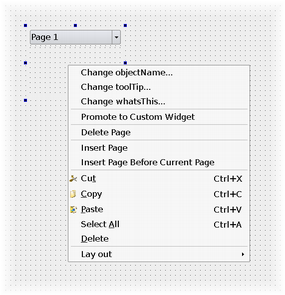QDesignerContainerExtension Class Reference
The QDesignerContainerExtension class allows you to add pages to a custom multi-page container in Qt Designer's workspace. More...
#include <QDesignerContainerExtension>
Public Functions
| virtual | ~QDesignerContainerExtension () |
| virtual void | addWidget ( QWidget * page ) = 0 |
| virtual int | count () const = 0 |
| virtual int | currentIndex () const = 0 |
| virtual void | insertWidget ( int index, QWidget * page ) = 0 |
| virtual void | remove ( int index ) = 0 |
| virtual void | setCurrentIndex ( int index ) = 0 |
| virtual QWidget * | widget ( int index ) const = 0 |
Detailed Description
The QDesignerContainerExtension class allows you to add pages to a custom multi-page container in Qt Designer's workspace.
QDesignerContainerExtension provide an interface for creating custom container extensions. A container extension consists of a collection of functions that Qt Designer needs to manage a multi-page container plugin, and a list of the container's pages.

Warning: This is not an extension for container plugins in general, only custom multi-page containers.
To create a container extension, your extension class must inherit from both QObject and QDesignerContainerExtension. For example:
class MyContainerExtension : public QObject,
public QDesignerContainerExtension
{
Q_OBJECT
Q_INTERFACES(QDesignerContainerExtension)
public:
MyContainerExtension(MyCustomWidget *widget,
QObject *parent = 0);
int count() const;
QWidget *widget(int index) const;
int currentIndex() const;
void setCurrentIndex(int index);
void addWidget(QWidget *widget);
void insertWidget(int index, QWidget *widget);
void remove(int index);
private:
MyCustomWidget *myWidget;
};
Since we are implementing an interface, we must ensure that it's made known to the meta object system using the Q_INTERFACES() macro. This enables Qt Designer to use the qobject_cast() function to query for supported interfaces using nothing but a QObject pointer.
You must reimplement several functions to enable Qt Designer to manage a custom multi-page container widget: Qt Designer uses count() to keep track of the number pages in your container, widget() to return the page at a given index in the list of the container's pages, and currentIndex() to return the list index of the selected page. Qt Designer uses the addWidget() function to add a given page to the container, expecting it to be appended to the list of pages, while it expects the insertWidget() function to add a given page to the container by inserting it at a given index.
In Qt Designer the extensions are not created until they are required. For that reason you must also create a QExtensionFactory, i.e a class that is able to make an instance of your extension, and register it using Qt Designer's extension manager.
When a container extension is required, Qt Designer's extension manager will run through all its registered factories calling QExtensionFactory::createExtension() for each until the first one that is able to create a container extension, is found. This factory will then create the extension for the plugin.
There are four available types of extensions in Qt Designer: QDesignerContainerExtension , QDesignerMemberSheetExtension, QDesignerPropertySheetExtension and QDesignerTaskMenuExtension. Qt Designer's behavior is the same whether the requested extension is associated with a multi page container, a member sheet, a property sheet or a task menu.
The QExtensionFactory class provides a standard extension factory, and can also be used as an interface for custom extension factories. You can either create a new QExtensionFactory and reimplement the QExtensionFactory::createExtension() function. For example:
QObject *ANewExtensionFactory::createExtension(QObject *object,
const QString &iid, QObject *parent) const
{
if (iid != Q_TYPEID(QDesignerContainerExtension))
return 0;
if (MyCustomWidget *widget = qobject_cast<MyCustomWidget*>
(object))
return new MyContainerExtension(widget, parent);
return 0;
}
Or you can use an existing factory, expanding the QExtensionFactory::createExtension() function to make the factory able to create a container extension as well. For example:
QObject *AGeneralExtensionFactory::createExtension(QObject *object,
const QString &iid, QObject *parent) const
{
MyCustomWidget *widget = qobject_cast<MyCustomWidget*>(object);
if (widget && (iid == Q_TYPEID(QDesignerTaskMenuExtension))) {
return new MyTaskMenuExtension(widget, parent);
} else if (widget && (iid == Q_TYPEID(QDesignerContainerExtension))) {
return new MyContainerExtension(widget, parent);
} else {
return 0;
}
}
For a complete example using the QDesignerContainerExtension class, see the Container Extension example. The example shows how to create a custom multi-page plugin for Qt Designer.
See also QExtensionFactory, QExtensionManager, and Creating Custom Widget Extensions.
Member Function Documentation
QDesignerContainerExtension::~QDesignerContainerExtension () [virtual]
Destroys the extension.
void QDesignerContainerExtension::addWidget ( QWidget * page ) [pure virtual]
Adds the given page to the container by appending it to the extension's list of pages.
See also insertWidget(), remove(), and widget().
int QDesignerContainerExtension::count () const [pure virtual]
Returns the number of pages in the container.
int QDesignerContainerExtension::currentIndex () const [pure virtual]
Returns the index of the currently selected page in the container.
See also setCurrentIndex().
void QDesignerContainerExtension::insertWidget ( int index, QWidget * page ) [pure virtual]
Adds the given page to the container by inserting it at the given index in the extension's list of pages.
See also addWidget(), remove(), and widget().
void QDesignerContainerExtension::remove ( int index ) [pure virtual]
Removes the page at the given index from the extension's list of pages.
See also addWidget() and insertWidget().
void QDesignerContainerExtension::setCurrentIndex ( int index ) [pure virtual]
Sets the currently selected page in the container to be the page at the given index in the extension's list of pages.
See also currentIndex().
QWidget * QDesignerContainerExtension::widget ( int index ) const [pure virtual]
Returns the page at the given index in the extension's list of pages.
See also addWidget() and insertWidget().